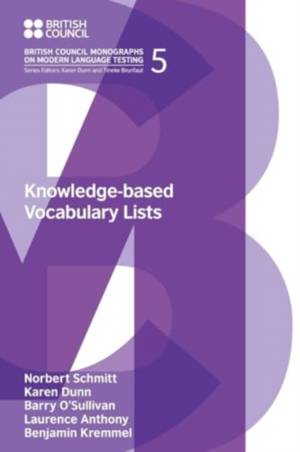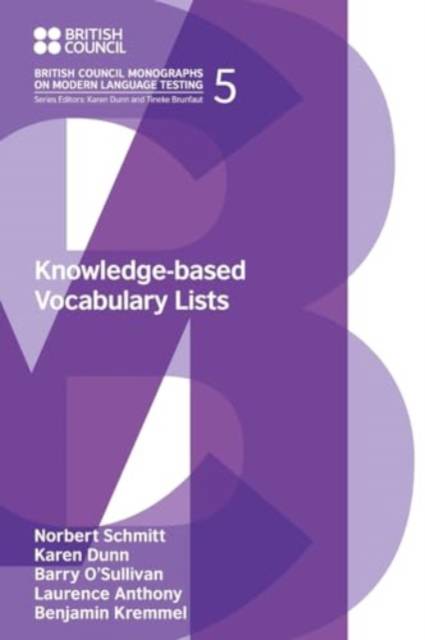
Door een staking bij bpost kan je online bestelling op dit moment iets langer onderweg zijn dan voorzien. Dringend iets nodig? Onze winkels ontvangen jou met open armen!
- Afhalen na 1 uur in een winkel met voorraad
- Gratis thuislevering in België vanaf € 30
- Ruim aanbod met 7 miljoen producten
Door een staking bij bpost kan je online bestelling op dit moment iets langer onderweg zijn dan voorzien. Dringend iets nodig? Onze winkels ontvangen jou met open armen!
- Afhalen na 1 uur in een winkel met voorraad
- Gratis thuislevering in België vanaf € 30
- Ruim aanbod met 7 miljoen producten
Zoeken
Knowledge-Based Vocabulary Lists
Norbert Schmitt, Karen Dunn, Barry O'Sullivan, Laurence Anthony, Benjamin Kremmel
€ 48,45
+ 96 punten
Uitvoering
Omschrijving
In teaching second language (L2) vocabulary, it is useful to have a way of prioritizing words to teach from among the multitude available. Word frequency, i.e. how often various words appear in written and spoken discourse, has typically been used to inform the emphasis taken. This volume explores the need for word lists based on direct tests of learner knowledge to inform L2 pedagogy. The Knowledge-based Vocabulary Lists (KVL) are introduced, and a description of the theoretical and practical basis for their development is given, highlighting pedagogical and assessment situations in which it is beneficial to know whether learners are likely to be able produce and correctly spell the words they know. A focus on L2 learners of English from Chinese, German, and Spanish L1 backgrounds resulted in three ranked lists of English-language word knowledge. The comparative probability of learners from these language backgrounds knowing each word are presented, and the correspondence with existing information about word frequency, word acquisition sequence, and word difficulty is explored. The value of the KVL is discussed in terms of providing one of the few evidence-based descriptions of L2 form-recall vocabulary knowledge available to teachers and researchers.
Specificaties
Betrokkenen
- Auteur(s):
- Uitgeverij:
Inhoud
- Aantal bladzijden:
- 224
- Taal:
- Engels
- Reeks:
Eigenschappen
- Productcode (EAN):
- 9781800504141
- Verschijningsdatum:
- 1/01/2024
- Uitvoering:
- Paperback
- Formaat:
- Trade paperback (VS)
- Afmetingen:
- 155 mm x 234 mm
- Gewicht:
- 503 g

Alleen bij Standaard Boekhandel
+ 96 punten op je klantenkaart van Standaard Boekhandel
Beoordelingen
We publiceren alleen reviews die voldoen aan de voorwaarden voor reviews. Bekijk onze voorwaarden voor reviews.











